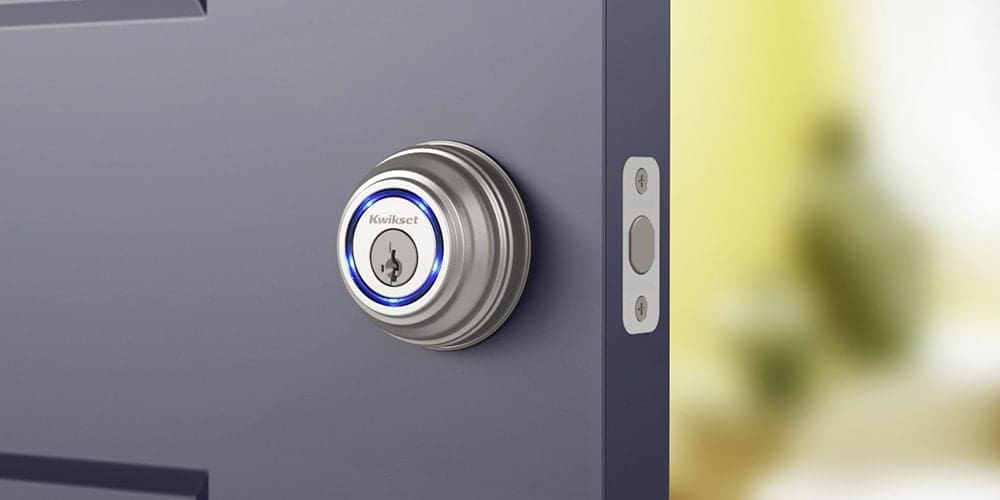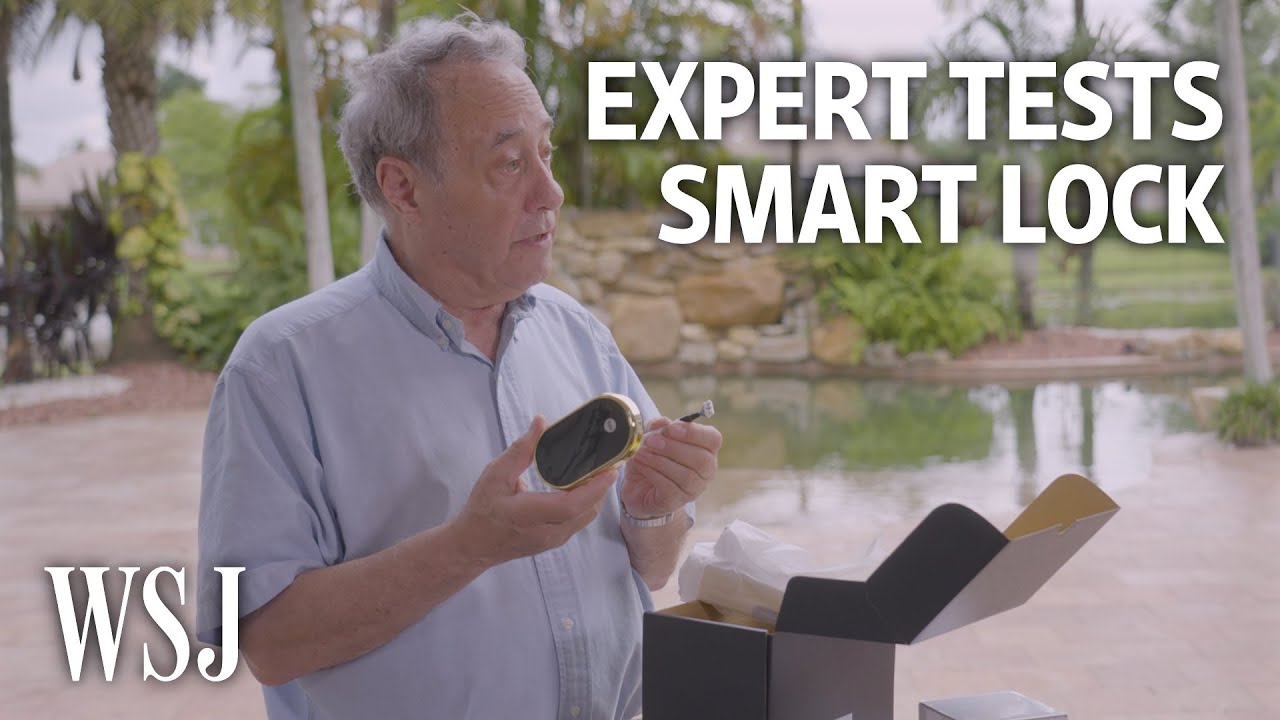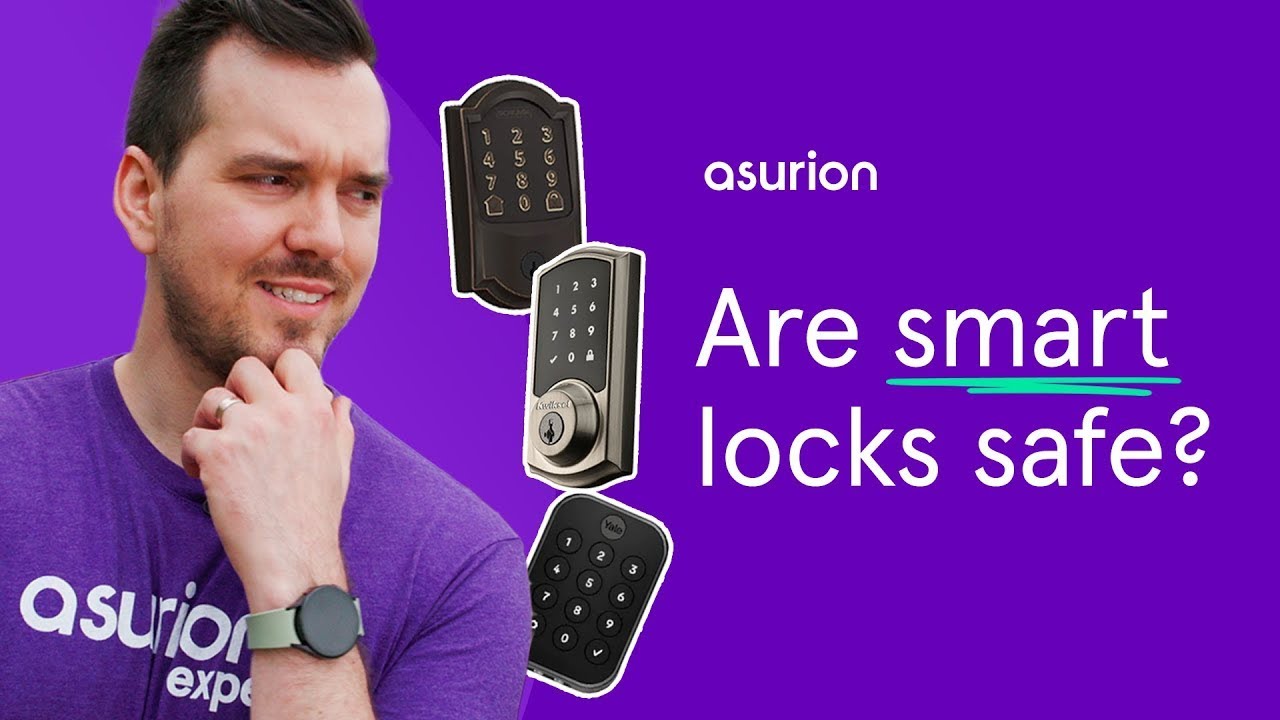A smart lock is a keyless lock that you control via a smartphone app. It uses wireless tech for remote operation and can integrate with smart home systems. Benefits include convenience, real-time tampering alerts, biometric authentication, and guest access management. However, they’re vulnerable to hacking, need constant power, and may not fit older doors. Consider easy installation, strong encryption, and reputable brands. Evaluate your security needs and smart home compatibility. By exploring more, you’ll uncover detailed insights into choosing the right smart lock for your home.
Key Takeaways
- Keyless Convenience: Smart locks offer keyless entry through biometric methods or smartphone apps, eliminating the need for traditional keys.
- Enhanced Security: They provide multiple layers of protection, including encryption and real-time tamper alerts, to secure your home.
- Integration with Smart Home Systems: Smart locks can seamlessly integrate with other smart home devices for centralized control and automation routines.
- Backup Solutions: They include mechanical key backups and power solutions to ensure access during power outages.
- Potential Drawbacks: Smart locks can be vulnerable to hacking, rely on power sources, and may face compatibility issues with older doors.
What Is a Smart Lock?
A smart seal is a keyless entrance seal you can control remotely using a smartphone application. This modern device brings the convenience of keyless entry, letting you seal or open your entrance with just a tap on your smartphone. With remote access, you can manage your home security from virtually anywhere, guaranteeing you never have to worry about leaving your entrance unsealed.
Smart seals are packed with advanced security features. Encryption safeguards your data, while biometric authentication, like fingerprint scanning, adds an extra layer of protection. You can also receive notifications whenever someone accesses your entrance, keeping you informed in real time.
In addition to enhancing security, these seals offer significant convenience. You can manage guest access by generating temporary or scheduled entrance codes, making it easy for friends, family, or service providers to enter your home without needing a physical key.
However, it’s important to be aware of potential compatibility issues. Some smart seals may not fit all entrance types or existing seal systems, and you’ll need to check for compatibility before making a purchase. Regular battery replacements are also necessary to guarantee uninterrupted functionality.
How Do Smart Locks Work?
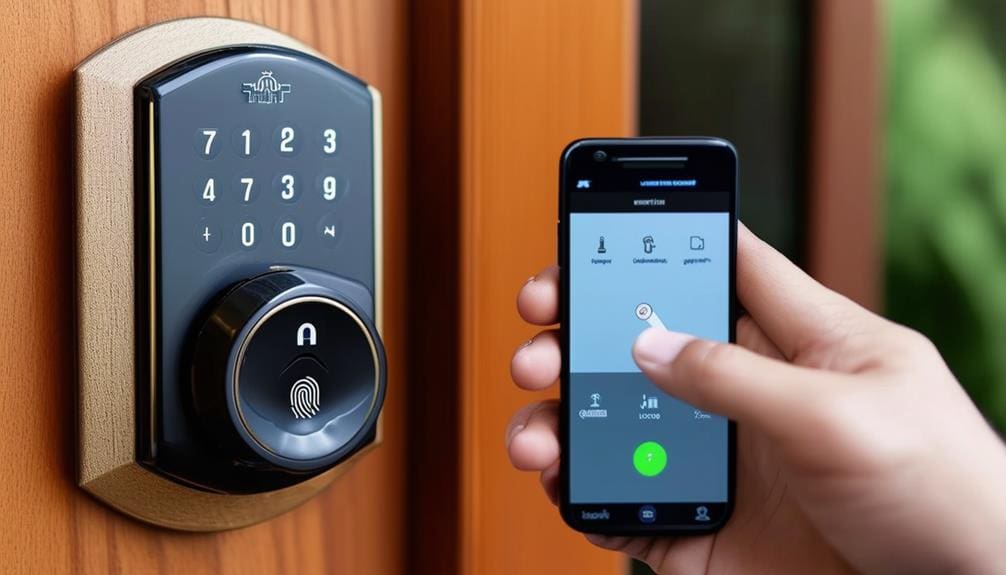
Understanding how smart locks operate involves exploring their utilization of wireless technology like Bluetooth or WiFi to communicate with your smartphone for seamless keyless entry. When you approach your door, your smartphone sends a signal to the smart lock via Bluetooth or Wi-Fi, prompting it to open without requiring a traditional key.
Smart locks often incorporate additional features such as biometric authentication, keypad entry, and voice control to improve usability. Biometric authentication involves using your fingerprint or facial recognition to open the door, adding an extra layer of security.
Remote access is another significant aspect of smart locks. By connecting your lock to Wi-Fi, you can lock or open your door from anywhere using an app on your smartphone. This feature is particularly useful for allowing in guests or service providers when you’re not home.
Integration into existing smart home systems allows you to control your smart lock alongside other devices like lights and thermostats, providing centralized control and automation.
Smart locks offer advanced security features like encryption and tamper alerts. Encryption ensures that the communication between your device and the lock remains secure, while tamper alerts notify you of any unauthorized attempts to access your lock, guaranteeing enhanced protection.
Enhanced Security Features
With smart locks, you gain access to advanced security features like biometric authentication methods, ensuring only authorized individuals can enter your home. Additionally, real-time tampering alerts instantly notify your smartphone of any suspicious activity, keeping you informed and proactive. These features provide multiple layers of protection, greatly enhancing your home’s security.
Biometric Authentication Methods
Embrace the enhanced security of smart locks by leveraging biometric authentication methods like fingerprint scanning, facial recognition, and voice recognition. These technologies add a robust layer of access control, guaranteeing only authorized individuals can access your door. Let’s break down these methods:
| Method | Functionality | Security Level |
|---|---|---|
| Fingerprint Scanning | Uses unique fingerprints for identification | High |
| Facial Recognition | Analyzes facial features to verify identity | High |
| Voice Recognition | Identifies users by their unique vocal patterns | Moderate to High |
Fingerprint scanning is one of the most reliable methods, offering high security due to the uniqueness of each person’s fingerprint. Facial recognition takes it a step further by analyzing distinct facial features, ensuring precise identification. Voice recognition adds a layer of convenience, identifying users through their vocal patterns.
To utilize these features, set up user profiles in your smart lock system. Each profile can store biometric data, encrypted and securely stored to prevent unauthorized access. This guarantees that access control remains strict, making your home notably safer compared to traditional key-based systems.
Real-Time Tampering Alerts
Receiving real-time tampering alerts on your smartphone guarantees you’re instantly aware of any unauthorized attempts to access your property. These notifications are essential for enhancing home security and providing peace of mind. When your smart lock detects tampering, it sends real-time alerts directly to your phone. You can take immediate action, whether it’s contacting authorities or checking your security cameras.
To maximize this feature, make sure your smart lock is properly set up to send notifications. Start by downloading the lock’s companion app and pairing it with your smartphone. Enable push notifications and configure the sensitivity settings to detect any unusual activity.
Smart locks often come with advanced security features like encryption and biometric authentication, further protecting against break-ins. Tampering alerts act as a deterrent to potential intruders, who are likely to abandon their attempts when they realize they’re being monitored.
The ability to monitor and receive alerts on tampering attempts adds an extra layer of security. This feature not only helps prevent break-ins but also guarantees the safety and security of your home. By staying informed about unauthorized attempts, you maintain control and enhance your home’s overall security.
Vulnerability to Hacking
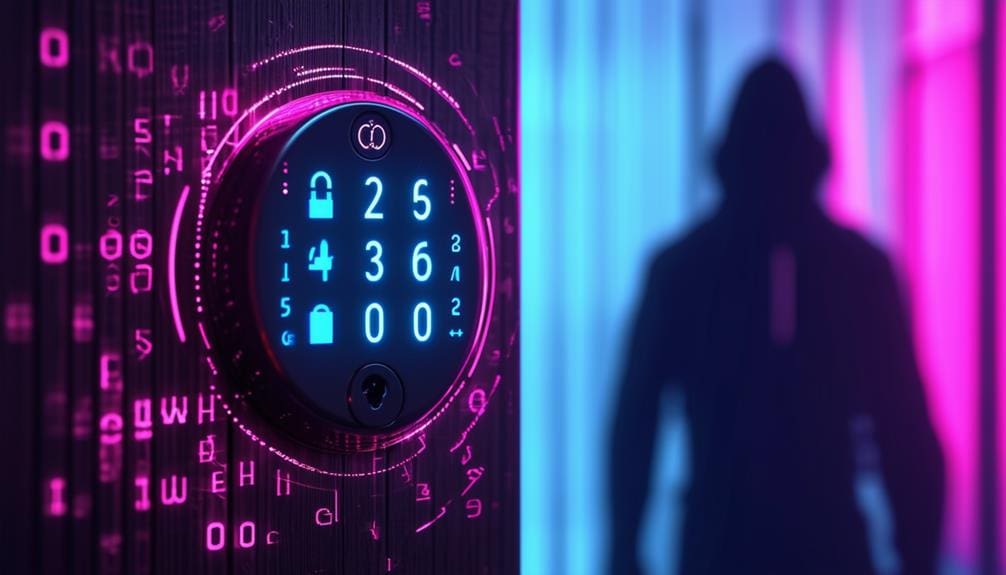
Smart locks, despite their convenience, face significant hacking risks due to their internet connectivity and software dependencies. These devices are vulnerable to hacking, making them an attractive target for hackers seeking unauthorized access to your home. To mitigate these risks, you must choose reputable brands that prioritize security measures.
First, make sure your smart lock uses strong encryption. Encryption scrambles the data exchanged between the lock and your device, making it harder for hackers to intercept and decipher it. Next, regularly update your smart lock’s software. Manufacturers often release software updates to patch vulnerabilities that hackers could exploit. Keeping your device updated is essential to maintaining its security integrity.
Additionally, monitor for suspicious activity. Many smart locks offer notifications for unusual access attempts. Enabling these alerts can provide early warnings of potential hacking attempts, allowing you to take action promptly.
Convenience and Keyless Entry
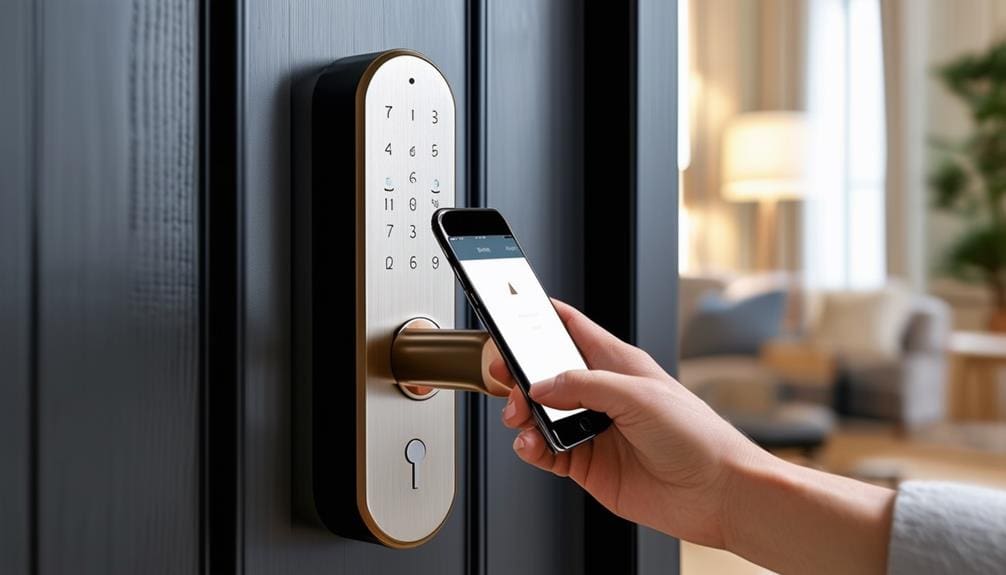
While addressing security concerns is essential, the convenience of keyless entry provided by smart locks greatly enhances daily life. Imagine arriving home with your hands full of groceries or dealing with inclement weather. With smart locks, keyless entry through smartphone apps, PIN codes, or fingerprint recognition makes entering your home effortless.
Temporary access codes are another significant advantage. You can create these codes for guests or service providers, eliminating the need for physical keys. This feature is particularly useful for Airbnb hosts or during home renovations.
Smart locks also offer seamless integration with other smart home devices. For instance, you can synchronize your smart lock with your home security system, lights, or even your thermostat, creating a cohesive and automated living experience.
Smartphone apps are central to this convenience, allowing you to secure or open your door remotely. Additionally, illuminated keypads enhance usability in low-light conditions, ensuring you can easily enter your home at night.
Power Outage Concerns
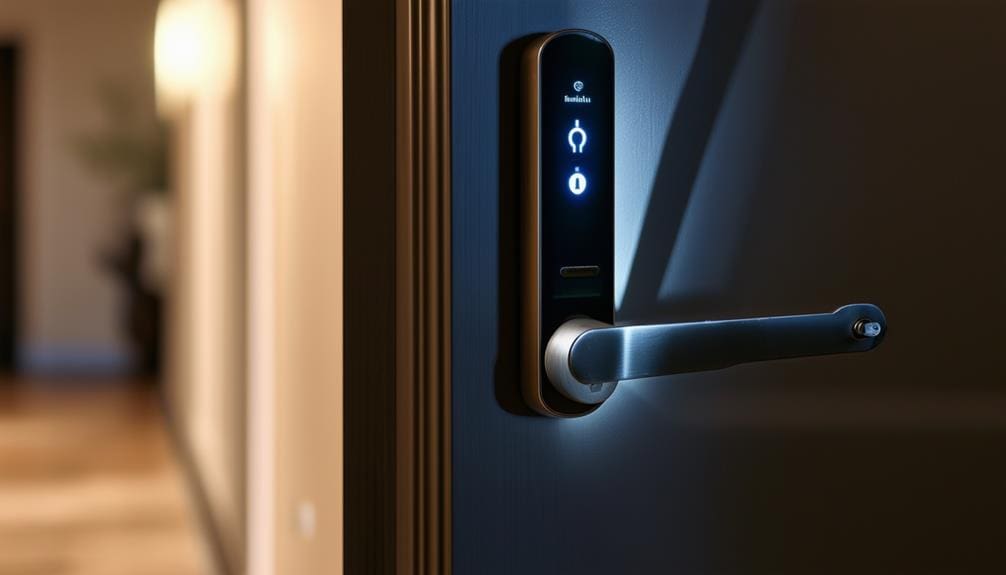
During a power outage, your smart lock might fail to function, leaving you potentially locked out of your home. Smart locks depend on consistent power sources like batteries or electricity to operate. Here’s how you can address power outage concerns:
- Mechanical Key Backup: Always make sure your smart lock includes a mechanical key option. This traditional backup allows you to manually open your door even if the electronic components fail.
- Backup Power Solutions: Invest in backup power solutions such as portable battery packs or solar chargers that can keep your smart lock operational during a power outage. These devices can be lifesavers in emergency situations.
- Regular Battery Checks: If your smart lock runs on batteries, perform regular battery checks and replacements. Keeping spare batteries on hand can help prevent lockouts caused by unexpected power failures.
- Smart Alerts: Opt for smart locks that offer low battery alerts or power status notifications. These alerts can prompt timely maintenance, ensuring your lock remains functional even during power disruptions.
Integration With Smart Homes
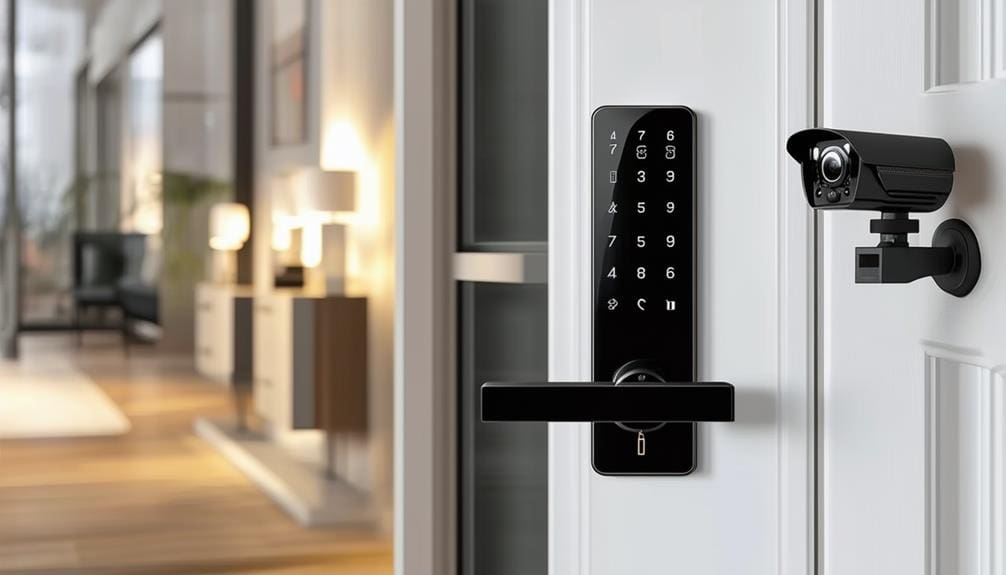
Integrating smart locks with your smart home system allows you to control access through voice commands or mobile apps. You can automate routines and schedules, guaranteeing personalized security and convenience. Confirm compatibility with other devices to create a centralized control hub for managing your home’s security and automation.
Voice Command Control
Smart locks, when integrated with your smart home system, allow you to secure and open doors effortlessly using voice command controls. This feature enhances both convenience and accessibility, making it a valuable addition to your home security systems.
Here’s how voice command control through smart home systems works:
- Setup: Integrate your smart lock with a compatible voice assistant like Amazon Alexa or Google Assistant. Follow the device-specific instructions to connect them.
- Voice Commands: Use simple voice commands to secure or open your door. For example, you can say, ‘Alexa, secure the front door,’ and the smart lock will respond immediately.
- Hands-Free Operation: Enjoy the hands-free operation, which is particularly useful when your hands are full or you’re in a hurry. This enhances convenience, allowing you to manage your home security effortlessly.
- Accessibility: This feature is especially beneficial for individuals with mobility challenges or limited dexterity, providing them with an easy and efficient way to control access to their home.
Automation Routines
Enhancing your home with automation routines allows you to synchronize your smart lock with other smart home devices, creating a seamless and efficient living environment. By integrating your smart lock with lights, thermostats, and security cameras, you can control multiple devices through one app or voice commands. This integration brings unparalleled convenience and security to your daily life.
To set up automation routines, start by using your smart home app to connect your smart lock with other devices. For example, you can create a routine that turns off the lights and adjusts the thermostat when you secure the door at night. Additionally, your smart lock can activate security cameras and send notifications if someone attempts unauthorized access.
Customizing automation routines based on lock status, time of day, or specific user activity can further enhance your home’s security and efficiency. Imagine arriving home, opening your door, and having the lights turn on and the thermostat set to your preferred temperature automatically. This level of integration offers you both convenience and peace of mind, knowing your home is secure and responsive to your needs.
Device Compatibility
Connecting your smart padlock with various smart home devices guarantees a seamless integration that enhances both security and convenience. By ensuring device compatibility with popular smart home platforms like Amazon Alexa, Google Assistant, and Apple HomeKit, you can manage your entire smart home ecosystem from a single interface. This enables centralized control, streamlining your home management process.
Here’s how you can achieve effective integration:
- Check Compatibility: Verify that your smart padlock supports integration with your existing smart home platforms. Look for compatibility with devices such as cameras, thermostats, and lights to create a cohesive system.
- Setup Integration: Follow the manufacturer’s instructions to link your smart padlock with your chosen smart home platform. This usually involves adding the padlock to your smart home app and configuring settings for seamless connectivity.
- Create Custom Routines: Utilize the integration to set up personalized routines. For instance, you can program your lights to turn on and your thermostat to adjust when you open the door.
- Centralized Control: Manage all your smart devices, including the smart padlock, through a single interface. This centralization simplifies operations, ensuring you maintain control over your home’s security and convenience effortlessly.
Installation and Appearance
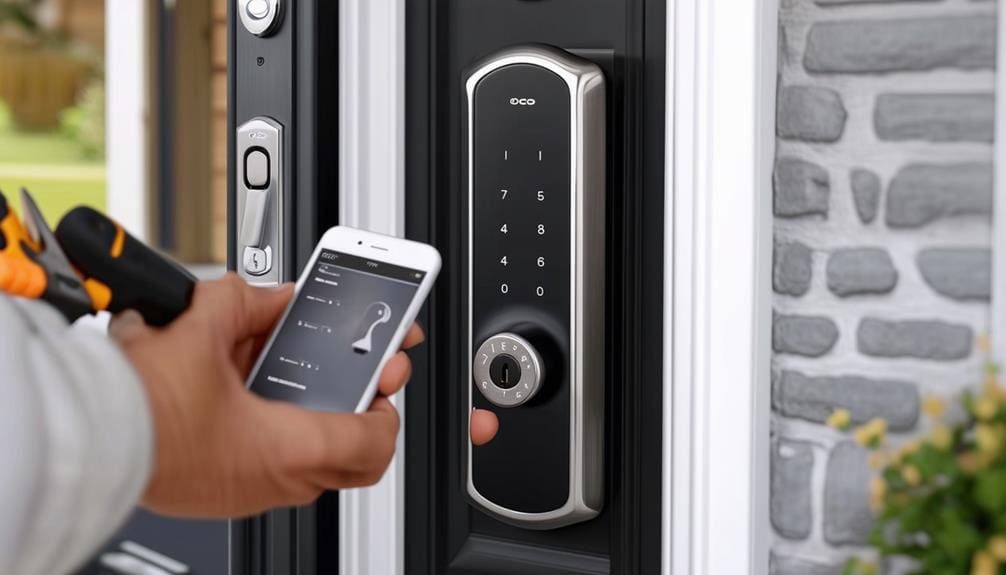
When choosing a smart lock for your home, consider both the installation process and the device’s appearance. Many smart locks are easy to install, often requiring just a screwdriver. For instance, the Level Lock offers a straightforward installation, allowing you to set up your smart lock without professional assistance. This can be an important time and cost saver.
In terms of appearance, smart locks vary widely. Some have a modern appearance that might not blend seamlessly with traditional home aesthetics. However, there are options like discreet smart lock kits from Level Home, which integrate seamlessly into your existing hardware, maintaining a stylish look.
Additionally, consider features such as illuminated keypads, which enhance usability at night. While these keypads add convenience, they also contribute to the modern look of the lock, which may or may not fit your aesthetic preferences.
Be mindful of the complexity of the security system you choose. While some smart locks are simple to install, others might be part of more complex security systems, requiring additional setup and potentially higher costs. Balancing ease of installation and visual appeal is pivotal when selecting the right smart lock for your home.
Expert Opinions and Recommendations
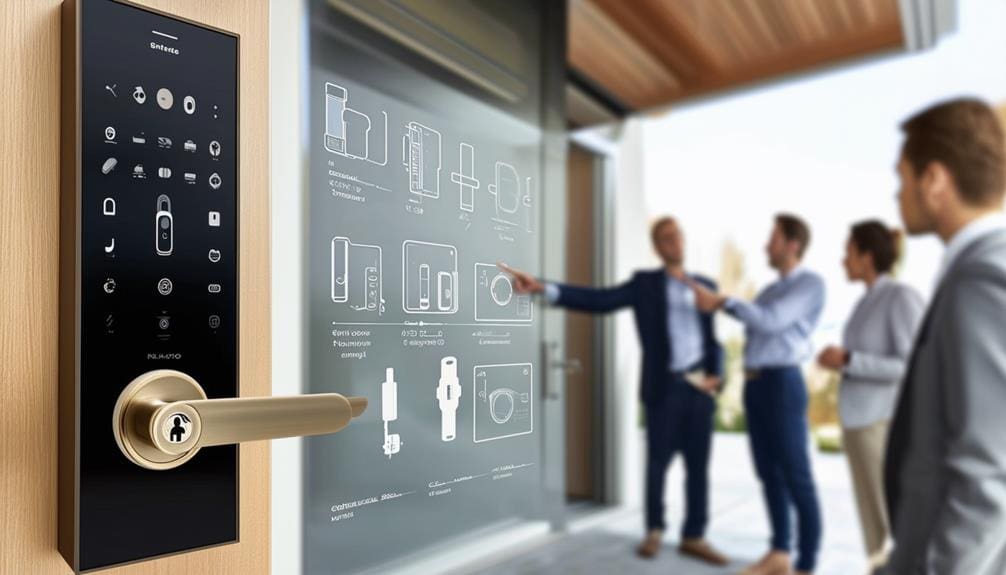
Considering the balance between installation ease and aesthetic appeal, it’s helpful to look at what experts recommend to guarantee you choose a smart lock that meets both your security and design needs. Experts emphasize several critical factors in selecting the right smart lock for your home:
- Prioritize Security Features: Smart locks offer various advanced security features. Experts recommend looking for models with strong encryption to protect against hacking risks. Regular software updates from reputable brands guarantee your lock stays secure.
- Evaluate Individual Security Needs: Your choice should align with your specific security requirements. Whether you need enhanced control or simple access management, identify what suits your lifestyle and security priorities.
- Choose Reputable Brands: Opt for smart locks from well-known, reputable brands. These brands are more likely to provide reliable devices and robust support, reducing potential security vulnerabilities.
- Integration with Smart Home Ecosystems: Smart locks offer seamless integration with other smart home devices. guarantee your chosen lock is compatible with your existing smart home system for a cohesive security solution.
Frequently Asked Questions
What Are the Pros and Cons of Smart Locks?
Smart locks offer enhanced security features and a high convenience factor with remote access. However, the installation process can be complex, compatibility issues may arise, and regular battery life maintenance is necessary.
What Is the Problem With Smart Door Locks?
Imagine Pandora’s box—smart door locks face security concerns, compatibility issues, installation challenges, and battery life problems. Remote access can fail, and malfunction risks increase, especially during power outages or with dead smartphone batteries.
What Are the Weaknesses of Smart Lock?
Smart locks have security vulnerabilities, require regular battery replacements, face connectivity issues, and can suffer from user error. Compatibility problems with older hardware and costly maintenance further complicate their use, impacting overall reliability and affordability.
What Are the Risks of Smart Locks?
You face several risks with smart locks: security concerns, hacking risks, and privacy issues. Vulnerabilities exposed through remote accessibility and technology limitations can compromise your home. Regular updates and reputable brands help mitigate these threats.
Conclusion
In the grand tapestry of home security, smart locks offer a double-edged sword. They blend enhanced security features with the convenience of keyless entry, making life easier. However, they’re not without flaws—vulnerability to hacking and power outage concerns loom large. Integrating seamlessly with smart homes, their installation and appearance are straightforward. So, weigh the pros and cons carefully. When it comes to smart locks, the choice is in your hands, quite literally.

